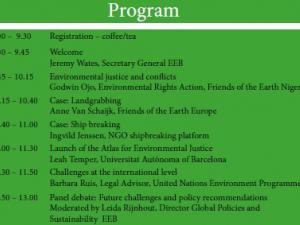Mapping Environmental Justice Conference & Debate
Event details
Description

Join us for this event on Environmental Justice in Brussels, where we will launch the new Atlas of Environmental Justice based on a database of almost 1000 cases (and growing) of ecological conflicts
About the event
As global consumption of resources increases exponentially, the search for energy and materials case the “commodity frontiers” to expand. Along the entire global chain of production – from extraction, to processing, to disposal – the fast increasing impacts are most often distributed highly unequally among populations. Those most heavily impacted are usually the already most marginalized sectors of the world population, who usually depend much more on local natural resources for their livelihood. A new Atlas of Environmental Justice – based on a database of almost 1000 cases (and growing) of ecological conflicts – illustrates the fast spreading turmoil.
The objective of the event is to bring attention to the increasing number of environmental conflicts in the world. More scarcity of resources, more aggressive ways of exploitation and practices like land grabbing are affecting local communities worldwide. On average, one activist is killed every week fighting for environmental justice and defending human rights. At the same time, overconsumption in Europe is fuelling this aggressive expansion of the commodity frontiers. If Europe takes this seriously, then an urgent shift towards more sustainable lifestyles needs to be promoted – for example in the Post 2015 SD Agenda. Europe has a key role to play in implementing new policies to encourage sustainable production and consumption models and to ensure our ecological debt is decreasing and not increasing, as is the actual trend. Circular economy concepts and shifting from ‘Efficiency’ towards ‘Sufficiency’ are some promising approaches.
During the event, we will launch the new Atlas of Environmental Justice as part of the EEB’s engagement in the EJOLT project. This map will serve as a database. It aims to cover ecological distribution conflicts around the world and it will serve as communication tool among Environmental Justice Organizations and scientists working on related issues. It will also help to better understand what the determinants of these conflicts are, who the main actors are and bring attention to the struggles for justice.
When: 19 March 2014, 09:00 - 13:00
Where: UNEP Liaison Office to the EU, Rue Montoyer 14, Brussels, Belgium
Read the final event report here.

About EJOLT
The Environmental Justice Organizations, Liabilities and Trade is an FP7 project supported by the European Commission that runs from 2011 until 2015.
The project supports the work of Environmental Justice Organizations (EJOs), uniting scientists, activist organizations, think-tanks, policy-makers from the fields of environmental law, environmental health, political ecology, ecological economics, to talk about issues related to Ecological Distribution. Central concepts are Ecological Debts (or Environmental Liabilities and Ecologically Unequal exchange).
Log in with your EU Login account to post or comment on the platform.